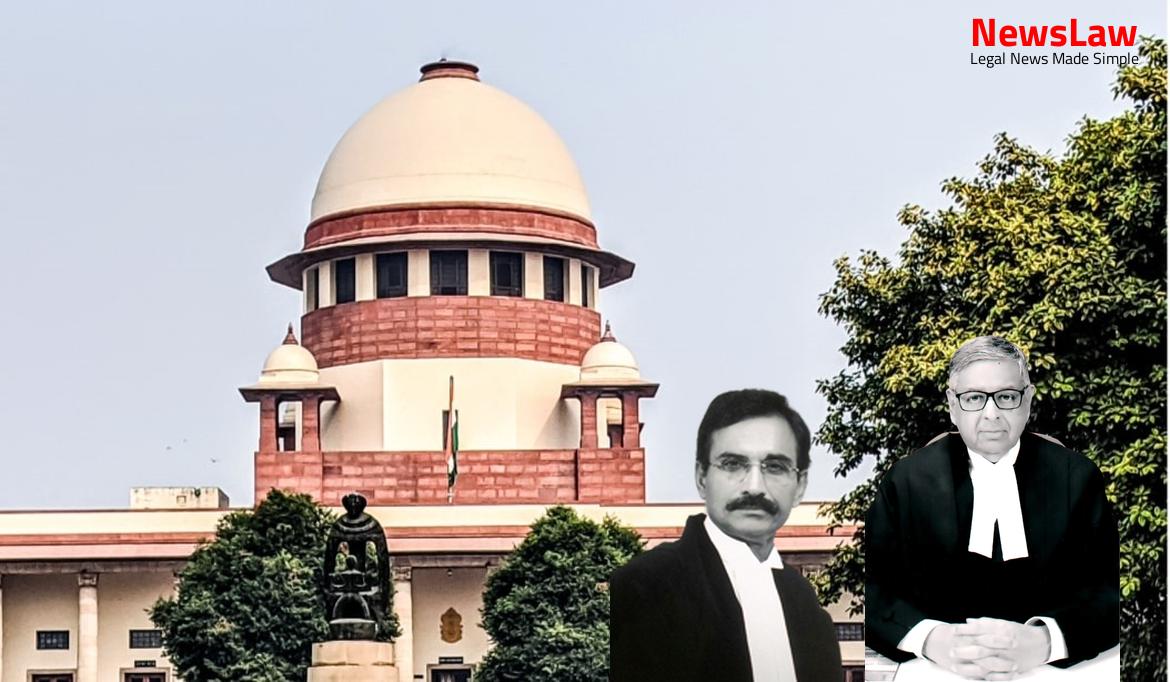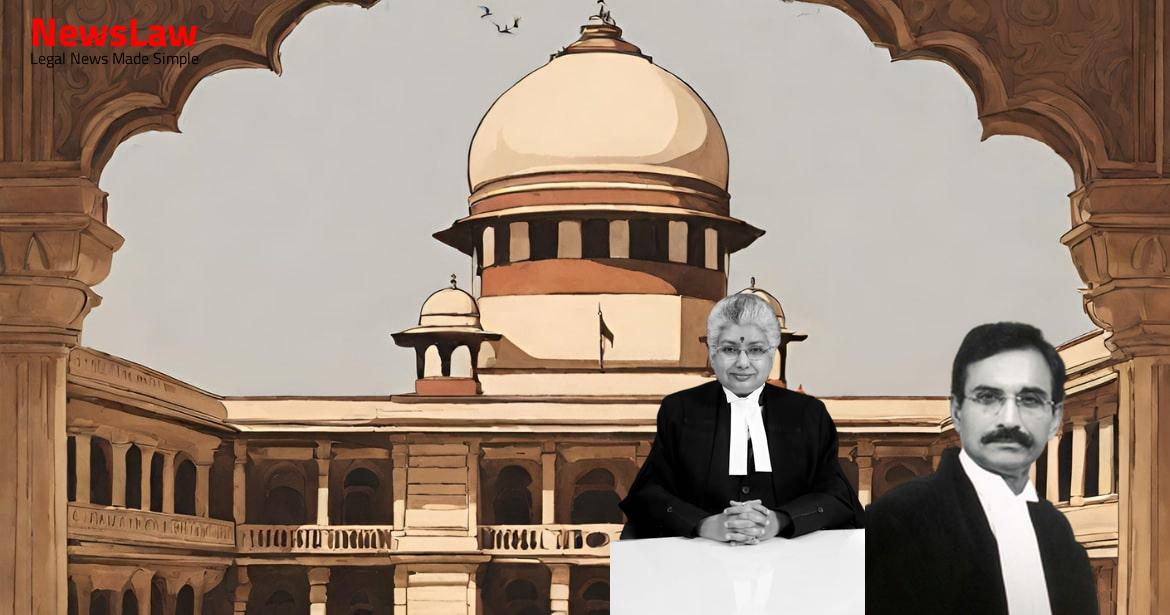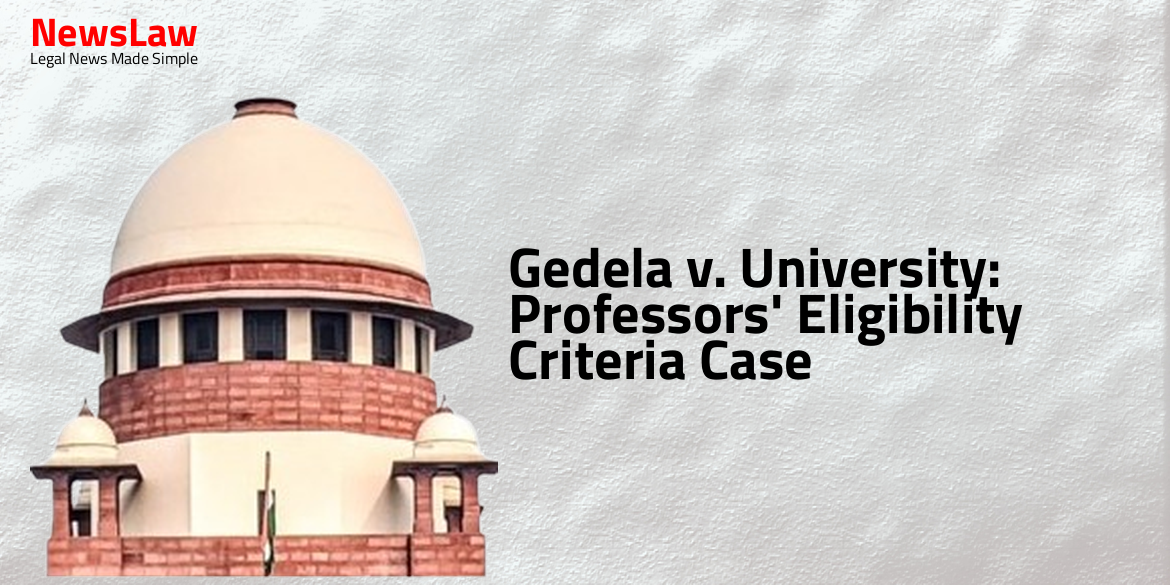The case delves into the legal intricacies surrounding the recognition of equivalency of qualifications in an employment dispute. The High Court’s analysis of Government Orders and their retrospective application sheds light on the complex nature of interpreting qualification requirements in job notifications. This summary focuses on the court’s legal reasoning and the implications for the parties involved, highlighting the importance of precise qualification criteria in recruitment processes.
Facts
- Many candidates with the same qualification may not have applied due to a misunderstanding of the prescribed qualification in the notification.
- The High Court disagreed with the Tribunal and allowed the original petition, setting aside the Tribunal’s order.
- Accepting Government Orders with retrospective effect would change the rules mid-way, which is impermissible.
Also Read: Contractual Interpretation in Real Estate Dispute
Issue
- Main issue is whether the appellants possessed the eligibility criteria for the posts of High School Assistants in Kerala
- Dispute over whether the appellants’ B.Ed. degrees fulfill the eligibility criteria
- Focus on whether the GOs dated 07 March, 2019 and 23 July, 2019 could apply to the appellants’ cases despite employment notifications in 2012 and 2014
Also Read: Non-compliance with requirements of Section 81(3) of the Representation of the People Act, 1951
Arguments
- Appellants argued that the Government Orders (GOs) recognized the status of their educational qualifications and met the eligibility requirement by confirming the equivalency of their B.Ed. subjects.
- Appellants claimed that rejection of the GOs recognizing their subsisting degrees as equivalent was unjust.
- Respondents cited the case of T. Jayakumar v. A. Gopu to argue that oversight in processing applications does not condone fatal defects.
- New Rules were said to operate prospectively and not retrospectively, but appellants argued that this should not apply in their cases.
- Court decisions cited in support of the High Court judgments emphasized that prevailing Rules at the time of employment notification should apply, and new Rules or amendments cannot be applied midway through a selection process.
- The authorities in the judgment on the same point are not being multiplied.
- The legality of introducing specific subjects in B.Ed. as qualifying criteria for the posts in question was argued by the learned counsel for the appellants.
Also Read: Setting Minimum Qualifying Marks for Viva Voce: A Question of Legality
Analysis
- The GOs issued by the State Government recognized the appellants’ B.Ed. degrees as equivalent to the required qualifications in the employment notifications.
- The appellants participated in the selection process based on this equivalence without objection.
- The eligibility criteria specified in the employment notifications required B.Ed. in the concerned subject.
- The GOs clarified the equivalence after the appellants obtained their degrees and participated in the selection process.
- The High Court’s reasoning focused on the timelines of the GOs compared to the issuance of employment notifications.
- The graduate degrees of the appellants were not aligned with the concerned subject specified in the notifications.
- The appellants’ appointments were impacted by the discrepancy in qualification requirements.
- The GOs were person-specific and not general orders, clarifying the equivalence to the subject in question.
- The High Court’s rulings were challenged due to the interpretation of the GOs and their timing.
- The orders issued post the employment notifications recognized the appellants’ degrees as equivalent to the required subjects.
- The principle of equivalency was applied to determine the standing of the appellants’ degrees related to the specified subjects.
- The State Government had the authority to issue orders on equivalence, leading to the resolution of the employment dispute.
- The High Court’s decisions were set aside based on the recognition of equivalency provided by the State Government and the universities.
- A specific employment scenario involving an Agricultural Field Officer post was highlighted to illustrate the application of equivalence in qualification requirements.
- The question of retrospective application of the GOs was debated in relation to the equivalence of the appellants’ degrees.
- Article 142 of the Constitution was invoked to serve justice in a specific case due to extenuating circumstances.
- The High Court relied on a Full Bench decision of the Kerala High Court in A. Suma v. The Kerala Public Service Commission & Ors. (2011) 1 KLT1 (FB).
- The judgment stated that the Commission could not determine the equivalence of educational qualifications unless the rules specifically allowed for recognition of other qualifications as equivalent.
- Certain judgments of the Kerala High Court were also referenced by the Kerala Public Service Commission (KPSC) on the same legal principle.
- In a case involving PK, it was held that equivalency specified after a notification could only be applied to future selections, as per the Supreme Court’s view on the matter.
- The rulings in Lalitha Bai v. Public Service Commission [1999 (2) KLT 894] and Rajasree v. State of Kerala [2009 (1) KLT 259] were also cited.
- In the case of Aarya K. Babu, the candidate was permitted to continue in the position despite lacking the specified qualification based on equivalency, as per a Supreme Court decision.
- Qualifications recognized by executive orders or standing orders of Government as equivalent to a specified qualification in the Special Rules are acceptable.
- Qualifications that presuppose the acquisition of a lower qualification required for the post are also deemed sufficient.
- Clause 13 allows the Commission to prescribe special qualifications in certain appointment scenarios.
- Education or other qualifications required for a post are as specified in Special Rules or in government executive orders.
- The case of A. Suma (supra) has no application to the appellants’ rights for consideration due to their B.Ed. degrees.
- The respondents’ counsel cited the decision in the case of Aarya K. Babu (supra).
- The appellants cited a coordinate Bench decision in the case of Beena R. v. Kerala Public Service Commission and Ors. [(2017) 15 SCC 306].
- In Beena R.’s case, there was no dispute regarding her possession of an equivalent qualification of KGTE (English typewriting).
- GOs confirmed equivalency of B.Ed. degrees only.
- Appellants’ degrees in B.Ed. were equivalent to requirements in employment notifications.
- Equivalency orders were clarificatory in nature.
- No fundamental breach of Notes (v) and (vi) of Clause 7 in employment notifications for appellants.
- Relief cannot be denied based on others not applying for the posts.
- Principle of possessing requisite qualification on date of notification not applicable as appellants had equivalent qualifications at the time of applying.
- Appellants deemed to have equivalent qualification on relevant date.
Decision
- All pending applications disposed of.
- Appeals allowed, appellants to be given appointment if they qualify.
- Appellants to be considered in service from date of appointment.
- No orders as to costs.
- Judgments under appeal set aside, Tribunal orders restored.
- Appellants not to be denied benefits on ground of list lapse.
Case Title: PRAVEEN KUMAR C.P. Vs. KERALA PUBLIC SERVICE COMMISSION (2021 INSC 404)
Case Number: C.A. No.-004846-004846 / 2021



